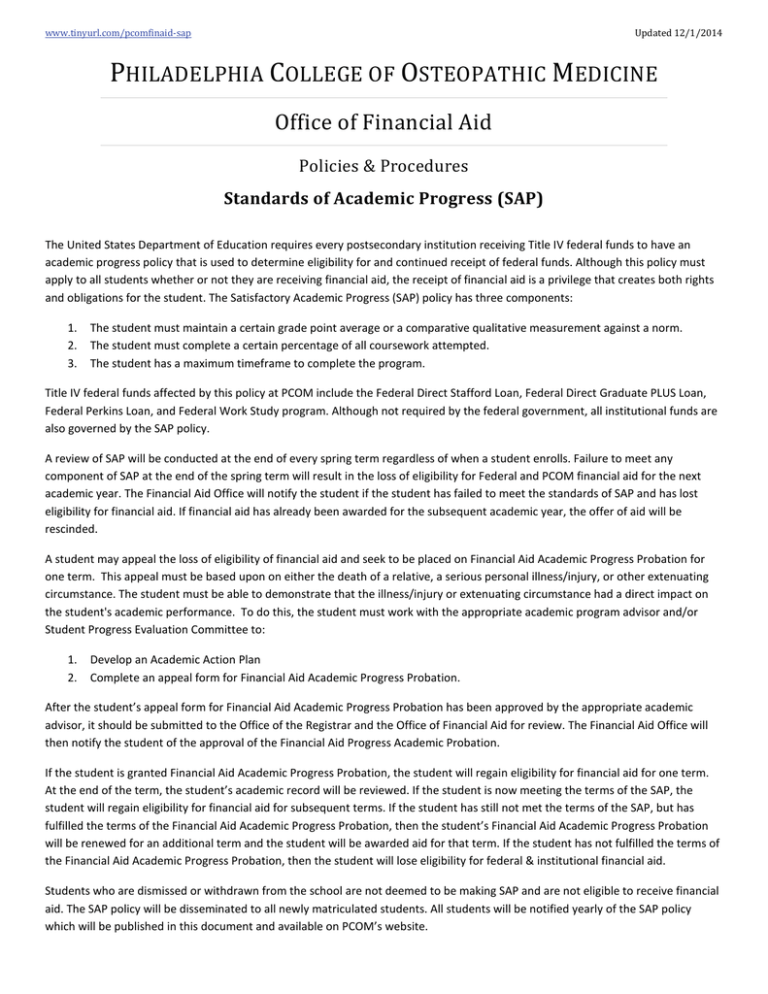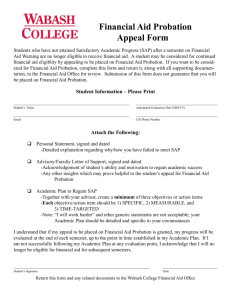Satisfactory Academic Progress
advertisement

www.tinyurl.com/pcomfinaid-sap Updated 12/1/2014 PHILADELPHIA COLLEGE OF OSTEOPATHIC MEDICINE Office of Financial Aid Policies & Procedures Standards of Academic Progress (SAP) The United States Department of Education requires every postsecondary institution receiving Title IV federal funds to have an academic progress policy that is used to determine eligibility for and continued receipt of federal funds. Although this policy must apply to all students whether or not they are receiving financial aid, the receipt of financial aid is a privilege that creates both rights and obligations for the student. The Satisfactory Academic Progress (SAP) policy has three components: 1. 2. 3. The student must maintain a certain grade point average or a comparative qualitative measurement against a norm. The student must complete a certain percentage of all coursework attempted. The student has a maximum timeframe to complete the program. Title IV federal funds affected by this policy at PCOM include the Federal Direct Stafford Loan, Federal Direct Graduate PLUS Loan, Federal Perkins Loan, and Federal Work Study program. Although not required by the federal government, all institutional funds are also governed by the SAP policy. A review of SAP will be conducted at the end of every spring term regardless of when a student enrolls. Failure to meet any component of SAP at the end of the spring term will result in the loss of eligibility for Federal and PCOM financial aid for the next academic year. The Financial Aid Office will notify the student if the student has failed to meet the standards of SAP and has lost eligibility for financial aid. If financial aid has already been awarded for the subsequent academic year, the offer of aid will be rescinded. A student may appeal the loss of eligibility of financial aid and seek to be placed on Financial Aid Academic Progress Probation for one term. This appeal must be based upon on either the death of a relative, a serious personal illness/injury, or other extenuating circumstance. The student must be able to demonstrate that the illness/injury or extenuating circumstance had a direct impact on the student's academic performance. To do this, the student must work with the appropriate academic program advisor and/or Student Progress Evaluation Committee to: 1. 2. Develop an Academic Action Plan Complete an appeal form for Financial Aid Academic Progress Probation. After the student’s appeal form for Financial Aid Academic Progress Probation has been approved by the appropriate academic advisor, it should be submitted to the Office of the Registrar and the Office of Financial Aid for review. The Financial Aid Office will then notify the student of the approval of the Financial Aid Progress Academic Probation. If the student is granted Financial Aid Academic Progress Probation, the student will regain eligibility for financial aid for one term. At the end of the term, the student’s academic record will be reviewed. If the student is now meeting the terms of the SAP, the student will regain eligibility for financial aid for subsequent terms. If the student has still not met the terms of the SAP, but has fulfilled the terms of the Financial Aid Academic Progress Probation, then the student’s Financial Aid Academic Progress Probation will be renewed for an additional term and the student will be awarded aid for that term. If the student has not fulfilled the terms of the Financial Aid Academic Progress Probation, then the student will lose eligibility for federal & institutional financial aid. Students who are dismissed or withdrawn from the school are not deemed to be making SAP and are not eligible to receive financial aid. The SAP policy will be disseminated to all newly matriculated students. All students will be notified yearly of the SAP policy which will be published in this document and available on PCOM’s website. Doctoral students must achieve a minimum cumulative GPA of 70. Graduate students must achieve a minimum cumulative GPA of 3.0. Graduate Certificate students must achieve a minimum cumulative GPA of 2.0. Pharmacy students must achieve a minimum cumulative GPA of 2.0. Doctor of Osteopathic students must: • • • Achieve a passing grade on all coursework, validations, exams, clinical clerkships. Passed COMLEX I by the end of year 3. Passed COMLEX II (both parts) by the end of year 4. Students must complete the appropriate percent of all courses attempted to maintain a good academic standing. The completion percentage is calculated by dividing total hours earned by total hours attempted. If a student changes degree programs, then the SAP status will be based on the academic record of the new program. It is also important to understand how specific grades and/or course types count toward the completion ratio. The following grades count as attempted but not completed courses: • • • • • Incomplete No Grade Reported Withdraw Failure Unsatisfactory All students at PCOM are required to maintain a 67% completion of coursework. Transfer credits will count towards a student’s attempted and completed credit hours. Students in the Doctor of Osteopathic have 7 years to complete the program from initial matriculation. Students in the Doctor of Psychology programs have 7 years to complete the program from initial matriculation. Students in the Pharmacy program have 6 years complete the program from initial matriculation. Students in Graduate programs students have 5 years complete the program from initial matriculation. Any term in which a student is enrolled counts towards the maximum timeframe regardless of whether or not the student receives federal financial aid. If you have any questions regarding these SAP policies & procedures, please contact: Michael Wisniewski Chief Financial Aid Officer 215-871-6173 michaelwisn@pcom.edu


